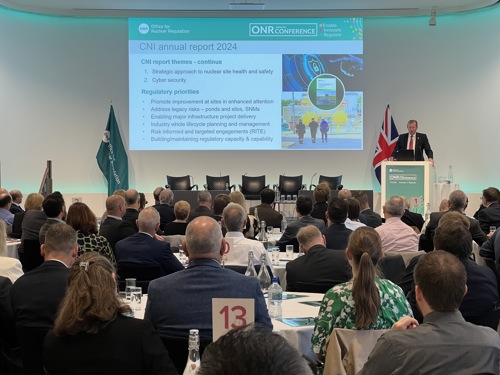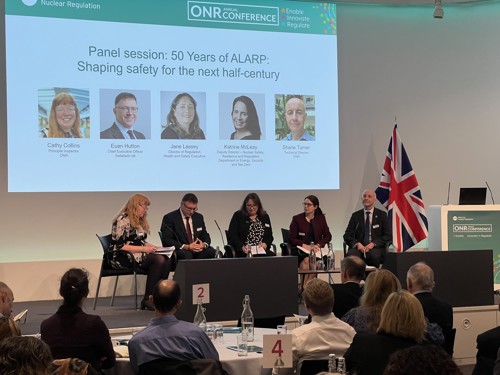Almost 140 industry delegates today attended the Office for Nuclear Regulation (ONR) Annual Conference for a spotlight on the regulatory landscape across Great Britain's nuclear sector.
The conference is an opportunity for ONR to engage constructively with a broad cross-section of industry stakeholders, reflecting on achievements and lessons learnt from the past 12 months, along with detailing regulatory priorities for the year ahead.
Representatives from the Nuclear Decommissioning Authority, Urenco UK Ltd, NNB GenCo, EDF, BAE Systems, Nuclear Restoration Services Limited, Rolls-Royce Submarines Ltd and Sellafield and many other dutyholders came to the Royal Society in London for a busy conference agenda titled ‘Enable, Innovate, Regulate’.
Mark Foy, ONR's Chief Executive and Chief Nuclear Inspector, spoke about his annual report which revealed how the British nuclear industry had performed satisfactorily during 2023/24 with strong standards of safety, security, and safeguards overall.
Mark highlighted positive strides made towards improvements in cyber security performance across the sector - a key regulatory priority during the last 12 months - and spoke of the ongoing work to achieve better results in conventional health and safety risk management.

Lord Hunt, Minister of State, Department for Energy Security and Net Zero (DESNZ), was among the main speakers and outlined the government's perspective on the UK's nuclear industry during this time of growth and expansion.
Lord Hunt said: "The role of the ONR is essential not just for addressing the issues of the past, but for maintaining public confidence in future nuclear sites as we pursue net zero.
"Robust, proportionate regulation is vital; it helps to drive investment into our new nuclear projects. It enables good projects to progress quickly and safely. And it builds public confidence in this remarkable technology.
"I am grateful for the work that ONR does to ensure that our nuclear industry is safe and secure."
A panel discussion dealt with the topic of '50 years of ALARP - shaping safety for the next half-century' - examining the 'as low as reasonably practicable' principle (ALARP) which is a fundamental requirement of UK health and safety legislation and the bedrock of standards across the nuclear industry.
Contributors from the stage on this subject included Shane Turner - ONR's Technical Director, Katrina McLeay, Deputy Director Nuclear Safety and Resilience from DESNZ and Jane Lassey, Director of Regulation, Health and Safety Executive.
Later in the day, Paul Fyfe, ONR's Senior Director of Regulation, spoke about ONR's modernisation programme to support continued fit-for-purpose oversight of the industry.
And Rachel Grant, ONR's Director of Strategy and Corporate Affairs, led a roundtable discussion about 'Strategic Horizons: The Next ONR Chapter', which focused on protecting society, through a modern ONR that delivers trusted outcomes and continues to inspire confidence.

After the conference, Mark Foy said: "This annual conference is a key date in our calendar, providing a forum for honest dialogue with industry stakeholders about challenges and opportunities during this busy period of new nuclear expansion, along with the focus needed for decommissioning and dismantling programmes at legacy facilities.
"I hope delegates got a real sense of the progress made by dutyholders upholding the strong track record of high standards across the industry.
"It is important that focus is maintained on areas where sustained improvements are still required so the industry continues to maintain safe nuclear operations.
"ONR fosters an enabling and collaborative approach across the UK nuclear industry to secure the high standards that ensures that local communities and workers are protected.
"We require sites to achieve high standards of safety and security and dutyholders to continue to learn from operational experience so construction, commissioning and nuclear operations support the successful, safe and secure delivery of UK energy and defence ambitions."